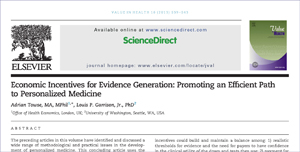Four types of economic incentives for drugs and diagnostics are essential to encouraging more rapid progress in personalised medicine. Adrian Towse, OHE’s Director, and Lou Garrison,…
Four types of economic incentives for drugs and diagnostics are essential to encouraging more rapid progress in personalised medicine.
Adrian Towse, OHE’s Director, and Lou Garrison, a professor at the University of Washington, summarise the critical economic issues in the development of evidence of value for drugs and diagnostics that are part of personalised medicine.
Adrian Towse, OHE’s Director, and Lou Garrison, a professor at the University of Washington, summarise the critical economic issues in the development of evidence of value for drugs and diagnostics that are part of personalised medicine.[1] Their article draws on the methodological and practical insights of the other contributions in a special supplement of Value in Health that addresses the role of health economics and outcomes research in personalised medicine.
Towse and Garrison note that progress in personalised medicine has been slower than many had hoped, but that clear progress is being made despite continuing scientific challenges. Encouraging more rapid progress in the development and availability of drugs and diagnostics that are essential to personalised medicine requires appropriate sets of economic incentives. Towse and Garrison identify four that they believe are essential to creating the evidence needed to value and most efficiently use drugs and diagnostics. These are:
- Pricing by payers that reflects value. This includes acceptance of the potential for pricing the same drug differently for particular populations as well as pricing for diagnostics that is based on their value to improving care, not just on their cost
- Some form of intellectual property protection or data exclusivity for diagnostics. Encouraging investment in evidence generation not only will create better data on clinical utility, but also can reward bringing higher-quality tests to market.
- Realistic expectations about standards of evidence. Data collection before the launch of a drug or diagnostic is limited by a number of considerations; allowing coverage with reasonable requirements for developing new evidence based on actual clinical practice can provide crucial additional data.
- Public investment in evidence collection that complements the efforts of payers and manufacturers. This recognizes that economic incentives alone are not likely to be sufficient for some important questions.
Tackling the scientific challenges requires, according to the authors, adjustments in the current pricing, evidence and intellectual property approaches. Essential is “building and maintaining a balance” across three sets of factors:
- Realistic evidence thresholds and payers’ needs for confidence in the clinical utility of the drugs and devices they purchase
- Payment for drugs and devices that both reflects value and promotes cost-effectiveness in health systems
- Enough intellectual property protection to both generate needed evidence at an acceptable cost and encourage the competition that can lead to “better and more efficient” tests.
Creating a positive economic environment, then, is an important component of fostering continuous advances in the science.
Towse, A. and Garrison, L.P. (2013) Economic incentives for evidence generation: Promoting an efficient path to personalized medicine. Value in Health. 16(6 Suppl), S39-S43. doi: 10.1016/j.jval.2013.06.003.
Other recent OHE activities on the topic of personalised, stratified or precision medicines include:
- Towse’s and Garrison’s contributions to the July 2013 Academy of Medical Sciences Report, Realising the potential of stratified medicines, available for download from the AMS website.
- Garau, M., Towse, A., Garrison, L., Housman, L. and Ossa, D. (2013) Can and should value-based pricing be applied to molecular diagnostics? Personalized Medicine. 10(1), 61-72. An earlier version is available as a Research Paper 12/03.
- Mattison, N. ed. (2013) The challenges and economics of drug development in 2022. London: Office of Health Economics.
- Towse’s analysis of valuing stratified/personalised medicine is contained in this short video: Challenges in valuing genomic medicines.
